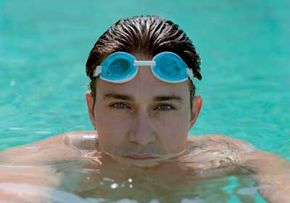The water, the sun, plenty of swimming and splashing around -- to many people, these are the ingredients for a perfect summer day spent by the pool or at the beach. Add a painful ear infection to the picture, however, and the scenario quickly slides downhill. That's what can happen to you if swimmer's ear strikes, unless you know what home remedies can prevent it.
Swimmer's ear is an infection of the outer ear canal caused sometimes by fungus but most commonly by bacteria. The frequent, prolonged exposure to water that occurs when someone swims regularly can wash away the oily, waxy substance that normally lines and protects the ear canal. In addition, even after the swimmer leaves the pool or pond, water can remain in the ear canal, creating a warm, moist environment that's perfect for breeding bacteria.
Advertisement
Despite the name, however, these external ear infections don't just occur in swimmers or in the summertime. Water can enter and pool in the outer ear canal after showers, too. And sometimes, exposure to water isn't required at all. Inserting anything into the ear, including a cotton swab, key, or fingernail, can scratch the skin in the ear canal and open the door to infection.
No matter its cause, swimmer's ear usually advertises its presence first with an itching or tingling sensation in the ear. Resisting the urge to scratch is essential, however, since rubbing or digging in the ear will only make the problem worse.
These early symptoms are generally followed by mild to severe pain in the external ear. Indeed, one way to distinguish swimmer's ear from an infection in the middle or inner ear is to gently tug on the earlobe, wiggle it, and move it back and forth. If such manipulation hurts, you likely have an outer-ear infection, or swimmer's ear.
In more serious cases, pain is accompanied by discharge from the ear and even some hearing loss due to swelling of the ear canal. For anything more than a mild, temporary case of swimmer's ear, you should see a doctor right away.
So that you won't have to suffer through any of this, read the following home remedies to find out how you can prevent swimmer's ear.
Watch where you swim. Avoid jumping into pools, ponds, lakes, oceans, or any other body of water in which the water may not be clean. Dirty water means more bacteria.
Get the water out. A key to preventing swimmer's ear is to not let water sit in the ear. If you feel or hear water swishing around in your ear after a shower or swim, try shaking your head in the direction of the affected ear to dislodge the water.
Add a few drops. Over-the-counter antiseptic eardrops, such as Aqua Ear, Ear Magic, or Swim Ear, used after swimming may help prevent or ease the problem for those who swim a lot and are already familiar with the symptoms of swimmer's ear.
According to the Academy of Otolaryngology-Head & Neck Surgery, as long as you have a normal eardrum and your doctor says it's safe for you, you can also use a homemade antiseptic mixture: In a small, clean container or bottle, mix equal amounts rubbing alcohol and white vinegar, then use a clean dropper to instill a couple drops in each ear after swimming or bathing. The white vinegar kills bacteria and fungus. The alcohol absorbs water and may also help kill bacteria and fungus. (You can buy a dropper bottle at a pharmacy.)
Along the same lines, some regular swimmers use a couple drops of rubbing alcohol or a mixture of equal parts white vinegar and clean water in each ear after leaving the water to keep the ears dry and infection free.
Cover your head. While a swim cap may not afford much protection for a competitive swimmer whose head is constantly in the water, it may keep water out of the ears of a casual swimmer or someone doing water exercises. Choose a swim cap that covers the ears tightly.
Stay out of your ears. You can exacerbate a mild case of swimmer's ear or promote infection by poking, swabbing, or scratching inside your ears. The wax produced in the ear is antibacterial and forms a natural protective barrier against moisture and minor irritation. So don't make it your goal in life to rid your ears of wax. And don't put anything in your ear that's smaller than your elbow. (If you're concerned that heavy wax buildup might be hindering your hearing, see an ear doctor, who can tell for sure and, if necessary, remove the extra wax safely.)
Advertisement
